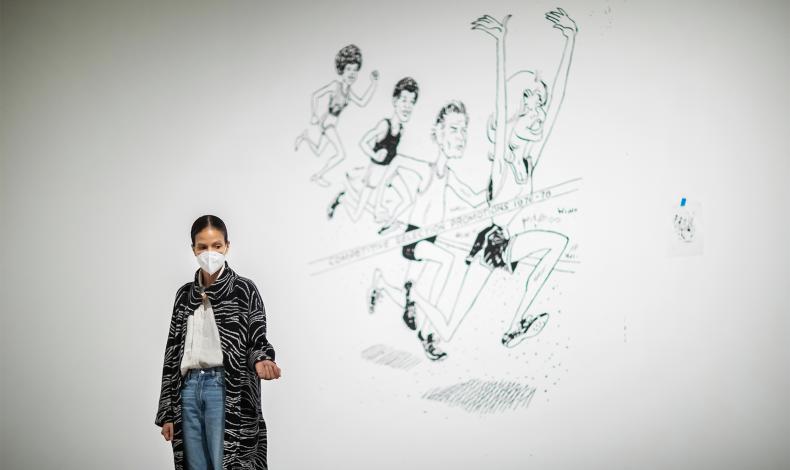MFA Alum Examines the Materials and Images of Labor in ICA Solo Exhibition

Artist and Weitzman alum Jessica Vaughn examines the spaces, architecture, and cultures of the American workplace her first major solo exhibition, now on view at the Institute of Contemporary Art.
Vaughn received a Master of Fine Arts degree from the Weitzman School of Design in 2011, studying with the late artist, Professor Terry Adkins. Born in Chicago and now living in New York City, she teaches at The New School while pursuing her own artistic practice.
The photographs, sculptures, paintings, and video in the ICA exhibition consider the systems that have shaped the places and cultures of work, labor, and affirmative action policies used to integrate the workforce, as well as modular designs and building systems that revolutionized the American office.
Penn Today spoke with Vaughn about the works in the new ICA exhibition and the influence of her experience at Penn.
How do your fine arts studies at Penn influence your work today?
When I came into the MFA program, I was primarily a 2-D person doing painting and printmaking. By the time I graduated I was really multidisciplinary and invested in media like sculpture, photography, and video. In undergrad (at Carnegie Mellon University) I studied both fine arts and social history, and continued this trajectory at Penn, taking studio courses and classes outside the art department. While in graduate school, I created photographs and videos of lots around Philadelphia. These temporarily unoccupied spaces were important connecting points to concepts of labor and political representation, which have always been central to my practice.
Race and gender are a thread throughout your work. How is your personal story reflected?
As an artist your personal identity informs the artwork you are interested in making and how you make it, but in my work it is not the only thing that guides my practice. The exhibition is about work, from the plethora of experiences I have had at day jobs to my own working opportunities I have had as an artist. I do feel that the work that I do outside of the studio, the life I have outside of it, all finds its way into this exhibition alongside larger political questions about how materials and images circulate in spaces of labor. A few of the artworks in the exhibition, such as Problem Sets and the video Our Primary Focus Is To Be Successful, focus on the drudge and routine architecture of the workplace that, in my experience, makes connections between race and power to capital and efficiency at one’s job paramount to issues of equity or any sort of interpersonal connections. I do think that perhaps the artworks Empties and the fabric works in the exhibition get closer to dealing with the mood, feelings, and attitudes of working rather than the aspects that are outside of a worker’s control.
How is that experience reflected in the video installation, at the entrance to the exhibition?
The soundtrack for the video is generic on-hold music recorded for American business phone systems. The video footage combines training tutorials on diversity in American workplaces with footage shot in various contemporary office spaces. Animated text in the video is derived from the training directives in the video, such as ‘Diversity will manage us and retention means having the best talent perform to the maximum.’ Like the hold music, these directives to me float through the exhibition indefinitely as an overall poetic feeling in the space. Taking my own workplace experiences into account and research into how workplace training tutorials are produced, distributed, and conceptualized, I tried to find imagery and video that speaks to the culture of training, specifically diversity training, and technical training that you would do for certain manual and care work professions. From the videos I appropriated both the video and directives that were narrated. I was interested in the texts from these videos that came across as best practices directives that spoke directly to managing workers or implementing diversity measures.
Read the full text of this story on Penn Today.

